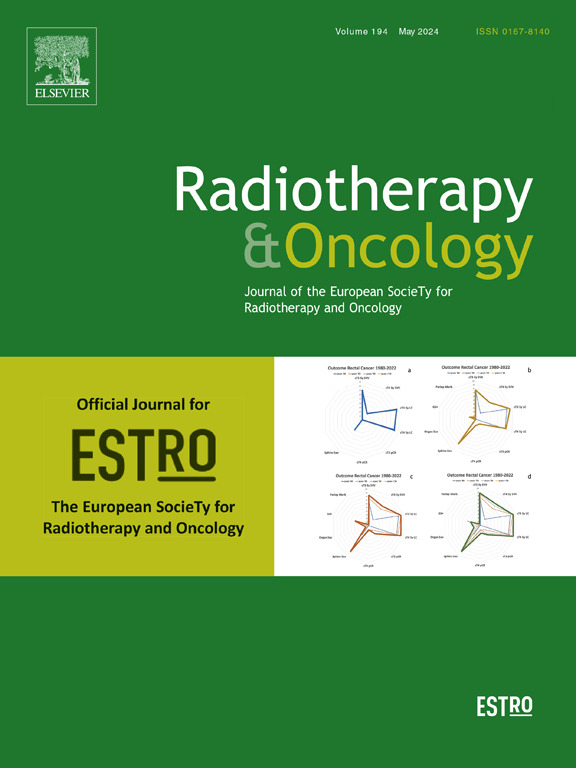少进展性疾病的随机化:我们还能进行试验吗,还是我们已经失去了平衡?
IF 5.3
1区 医学
Q1 ONCOLOGY
引用次数: 0
摘要
目的:低进展性疾病提出了一个治疗挑战,关于患者是否应该接受立体定向消融放疗(SABR)或继续全身治疗的争论正在进行。本研究通过评估随机化模式和比较在试验中治疗的患者与在试验外接受SABR治疗的患者的基线临床特征来评估正在进行的随机对照试验(rct)的可行性。材料和方法:两项正在进行的前瞻性试验研究治疗策略:SUPPRESS-Lung (NCT04405401),专注于SABR治疗少进展性肺癌,以及SUPPRESS-General (NCT04989725),包括其他组织学。同时为接受SABR非试验的患者建立了登记处。本研究比较了两个队列的随机化模式和临床特征。对基线特征进行描述性分析,对连续变量进行配对t检验,认为p<;0.05具有统计学意义。结果:在2021年6月至2025年1月期间,72例患者被随机纳入试验,88例患者接受非试验治疗,共计160例患者。RCT患者占队列的40%,而60%的患者在试验外治疗。随机患者的疾病部位分布各不相同:肺癌为45%,乳腺癌为56%,胃肠道癌为49%,泌尿生殖系统癌为75%,头颈癌为50%。随机分组的患者有更高的转移性负担,平均有2.4个进展性病变(范围:1-5),而登记组患者为1.1个(范围:1-3)。RCT患者的总转移病灶为6.4(范围:1-20),而注册患者为2.4(范围:0-20)。两组患者的系统治疗史相似,平均1.4条既往治疗线。结论:RCT患者有较大的疾病负担。很大一部分患者是在试验外治疗的,特别是那些只有一个低进行性病变的患者,这引起了人们对在这种情况下进行随机试验可行性的担忧。本文章由计算机程序翻译,如有差异,请以英文原文为准。
RANDOMIZATION IN OLIGOPROGRESSIVE DISEASE: CAN WE STILL RUN TRIALS, OR HAVE WE LOST EQUIPOISE?
Purpose:
Oligoprogressive disease presents a therapeutic challenge, with ongoing debate on whether patients should receive stereotactic ablative radiotherapy (SABR) or continue systemic treatment. This study evaluates the feasibility of ongoing randomized controlled trials (RCTs) by assessing randomization patterns and comparing baseline clinical characteristics of patients treated within a trial versus those receiving SABR off-trial.
Materials and Methods:
Two ongoing prospective trials investigate treatment strategies: SUPPRESS-Lung (NCT04405401), focusing on SABR for oligoprogressive lung cancer, and SUPPRESS-General (NCT04989725), including other histologies. A registry was simultaneously established for patients receiving SABR off-trial. This study compares randomization patterns and clinical characteristics between the two cohorts. Baseline characteristics were analyzed descriptively, with paired t-tests for continuous variables, considering p<0.05 statistically significant.
Results:
Between June 2021 and January 2025, 72 patients were randomized in the trials, and 88 received treatment off-trial, totaling 160 patients. RCT patients represented 40% of the cohort, while 60% were treated off-trial. The distribution of randomized patients by disease site varied: 45% in lung cancer, 56% in breast cancer, 49% in gastrointestinal cancer, 75% in genitourinary cancer, and 50% in head and neck cancer. Randomized patients had a higher metastatic burden, with a mean of 2.4 progressive lesions (range: 1–5) compared to 1.1 (range: 1–3) in registry patients. The total metastatic lesions were 6.4 (range: 1–20) in RCT patients versus 2.4 (range: 0–20) in registry patients. Systemic treatment history was similar, with both groups averaging 1.4 prior treatment lines.
Conclusions:
RCT patients had greater disease burden. A significant portion of patients were treated off-trial, especially those with a single oligoprogressive lesion, raising concerns about the feasibility of randomized trials in this setting.
求助全文
通过发布文献求助,成功后即可免费获取论文全文。
去求助
来源期刊

Radiotherapy and Oncology
医学-核医学
CiteScore
10.30
自引率
10.50%
发文量
2445
审稿时长
45 days
期刊介绍:
Radiotherapy and Oncology publishes papers describing original research as well as review articles. It covers areas of interest relating to radiation oncology. This includes: clinical radiotherapy, combined modality treatment, translational studies, epidemiological outcomes, imaging, dosimetry, and radiation therapy planning, experimental work in radiobiology, chemobiology, hyperthermia and tumour biology, as well as data science in radiation oncology and physics aspects relevant to oncology.Papers on more general aspects of interest to the radiation oncologist including chemotherapy, surgery and immunology are also published.
 求助内容:
求助内容: 应助结果提醒方式:
应助结果提醒方式:


